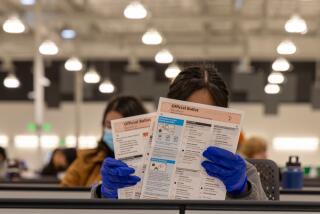Editorial: Don’t allow voter coercion and corruption to take hold in California
Democrats Luis Lopez and Wendy Carrillo are running for Assembly District 51 in a special election on Dec. 5. With only a small percentage of registered voters expected to cast ballots, victory could turn on just a few votes, putting extra pressure on campaign workers to squeeze out support where they can.
In the typical get-out-the-vote effort, campaign workers try to boost turnout by making calls and hoofing it from door to door to plead for votes. But there are reports that some canvassers in the District 51 race have gone a step further, asking voters to complete and hand over their vote-by-mail ballots. Lopez’ campaign has warned supporters about intimidation from Carillo canvassers asking for ballots, and one writer in the district said a Carillo campaign worker came to his door and pressured him to hand over his completed absentee ballot. He was outraged.
Ballot collection isn’t illegal, though it is understandable why some might feel uneasy about it. Ballots are supposed to be sacrosanct. When you vote at your local polling place, poll workers don’t urge you to support this candidate or that. They’re bound by rules that are designed to ensure they don’t influence voters or improperly handle a completed ballot. Things are necessarily looser for mail ballots, because you vote where you want to and with whom. The tradeoff, though, is that it’s easier for campaigns to strong-arm these voters.
Ballots are supposed to be sacrosanct. When you vote at your local polling place, poll workers don’t urge you to support this candidate or that.
Then there’s the integrity of the ballot itself. It’s one thing to trust the U.S. Postal Service, which presumably doesn’t have an interest in state and local races, to deliver your ballot. It’s quite another to trust a stranger who shows up at the door one day promising to make sure your vote gets counted.
In previous years, only a family member or a member of the household was authorized to deliver a ballot on behalf of a registered voter. But the Legislature changed the rules in 2016 when it passed AB 1921 as part of a package of reforms intended to raise turnout.
At the time, voting security advocates raised concerns that the provision would throw open the door to voter coercion, giving groups such as labor unions or megachurches another tool to pressure members to vote a certain way. Also troubling is the potential for malfeasance or negligence, given that the law provides no safeguards to ensure that the ballots make it to official election facilities in time to be counted. And although the law forbids campaigns to pay for ballot collecting, there’s no clear way to enforce the ban.
The bill’s author, Assemblywoman Lorena Gonzalez Fletcher (D-Chula Vista), plans cleanup legislation next session; at the very least, she should consider limiting the number of ballots a single person can collect and requiring ballots be turned in swiftly and by Election Day. More broadly, lawmakers should reassess the wisdom of allowing unlimited and unverified third-party ballot-collection before the 2018 campaigns begin in earnest. And voters should always be wary of strangers offering to bear away ballots.
These days more Californians vote by mail than do so in person. If it means more people are voting, that’s a good thing — as long as we can be sure that their votes are being cast and counted properly.
Follow the Opinion section on Twitter @latimesopinion and Facebook
More to Read
A cure for the common opinion
Get thought-provoking perspectives with our weekly newsletter.
You may occasionally receive promotional content from the Los Angeles Times.






